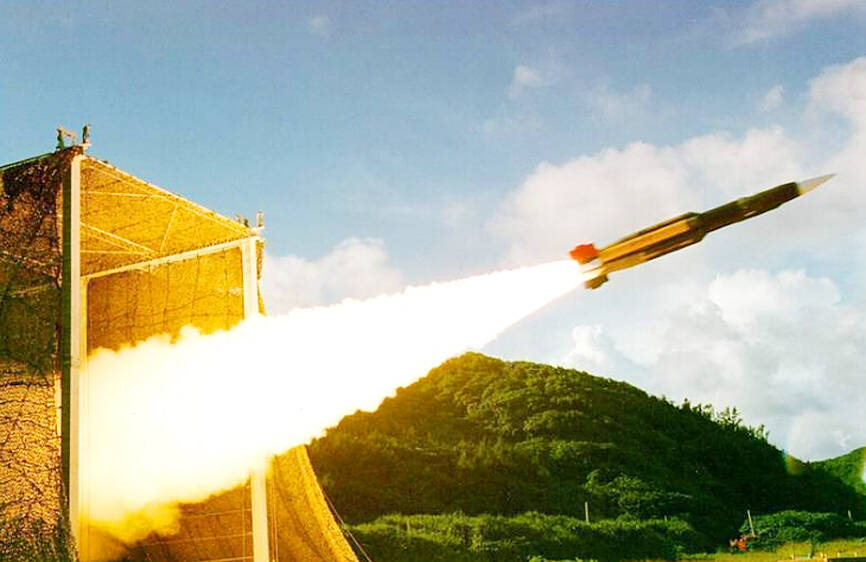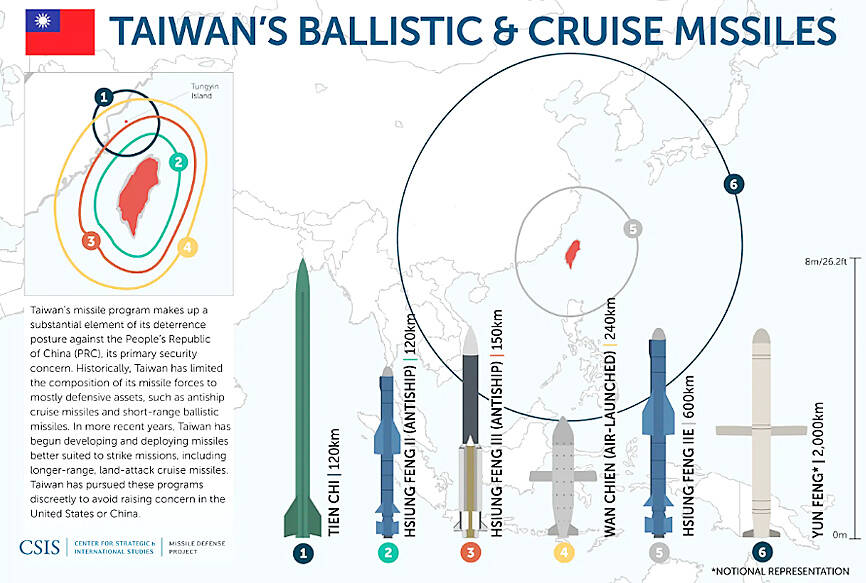The air force has received domestically developed supersonic cruise missiles with a range of 2,000km, a source said on Saturday.
The Ching Tien (擎天) missile, which can hit targets north of Beijing, is being deployed by the air force and has entered mass production, the source said.
The addition of the Ching Tien means that the military now has four missile types with ranges of more than 1,000km, including an extended-range variant of the Hsiung Feng IIE, the source said.

Photo: Screen grab from Chungshan Institute of Science and Technology’s Web site
The Ching Tien was discussed in a report by the Washington-based Center for Strategic and International Studies think tank when the missile was still in development.
Then codenamed Yunfeng (雲峰), the missile was reported to have a range of 1,200km to 2,000km, making it Taiwan’s longest-range missile.
More recent information suggests that the Ching Tien’s range is on the higher side of that estimate, and the Chungshan Institute of Science and Technology (CSIST), which developed the missile, is continuing to make improvements, the source said.

Photo: Screen grab from Center for Strategic and International Studies’ Web site
The Hsiung Feng IIE, of which there are two main variants — the Type A and Type B — is also undergoing improvements, the source said.
“Type A has a range of 500km, while the extended-range Type B has a range of more than 1,000km,” the source said.
“The two variants use different propulsion systems,” they said. “Type B uses a turbofan engine propulsion system, which can fly further while conserving fuel.”
The Type A missiles were first successfully tested in 2004, while the Type B missiles were first successfully tested in 2007, the source said, adding that both are now mass-produced and are being used by the air force’s special missile brigade.
“The Type B has been reported to have a range anywhere between 1,200km and 1,500km, meaning it can strike inland targets in China. It could be fired from mobile launchers during a counterattack,” the source said.
Former CSIST president Kung Chia-cheng (龔家政) previously said that Taiwan’s first domestically produced ballistic missile had been developed during the administration of former president Chen Shui-bian (陳水扁) as part of the “Tien Gung Project.”
That project produced two types of missiles — one with a range of 600km and the other with a range of more than 1,000km, the source said.
“Kung says in his book that Chen once inspected the tunnels at the Jiupeng base where the missiles were tested, and he was astonished by the size of the missiles,” the source added.

Intelligence agents have recorded 510,000 instances of “controversial information” being spread online by the Chinese Communist Party (CCP) so far this year, the National Security Bureau (NSB) said in a report yesterday, as it warned of artificial intelligence (AI) being employed to generate destabilizing misinformation. The bureau submitted a written report to the Legislative Yuan in preparation for National Security Bureau Director-General Tsai Ming-yen’s (蔡明彥) appearance before the Foreign Affairs and National Defense Committee today. The CCP has been using cognitive warfare to divide Taiwanese society by commenting on controversial issues such as Taiwan Semiconductor Manufacturing Co’s (TSMC, 台積電) investments in the

HELPING HAND: The steering committee of the National Stabilization Fund is expected to hold a meeting to discuss how and when to utilize the fund to help buffer the sell-off The TAIEX plunged 2,065.87 points, or 9.7 percent, to close at 19,232.35 yesterday, the highest single-day percentage loss on record, as investors braced for US President Donald Trump’s tariffs after an extended holiday weekend. Amid the pessimistic atmosphere, 945 listed companies led by large-cap stocks — including Taiwan Semiconductor Manufacturing Co (TSMC, 台積電), Hon Hai Precision Industry Co (鴻海精密) and Largan Precision Co (大立光) — fell by the daily maximum of 10 percent at the close, Taiwan Stock Exchange data showed. The number of listed companies ending limit-down set a new record, the exchange said. The TAIEX plunged by daily maxiumu in just

INVESTIGATION: The case is the latest instance of a DPP figure being implicated in an espionage network accused of allegedly leaking information to Chinese intelligence Democratic Progressive Party (DPP) member Ho Jen-chieh (何仁傑) was detained and held incommunicado yesterday on suspicion of spying for China during his tenure as assistant to then-minister of foreign affairs Joseph Wu (吳釗燮). The Taipei District Prosecutors’ Office said Ho was implicated during its investigation into alleged spying activities by former Presidential Office consultant Wu Shang-yu (吳尚雨). Prosecutors said there is reason to believe Ho breached the National Security Act (國家安全法) by leaking classified Ministry of Foreign Affairs information to Chinese intelligence. Following interrogation, prosecutors petitioned the Taipei District Court to detain Ho, citing concerns over potential collusion or tampering of evidence. The

‘COMPREHENSIVE PLAN’: Lin Chia-lung said that the government was ready to talk about a variety of issues, including investment in and purchases from the US The National Stabilization Fund (NSF) yesterday announced that it would step in to staunch stock market losses for the ninth time in the nation’s history. An NSF board meeting, originally scheduled for Monday next week, was moved to yesterday after stocks plummeted in the wake of US President Donald Trump’s announcement of 32 percent tariffs on Taiwan on Wednesday last week. Board members voted to support the stock market with the NT$500 billion (US$15.15 billion) fund, with injections of funds to begin as soon as today. The NSF in 2000 injected NT$120 billion to stabilize stocks, the most ever. The lowest amount it